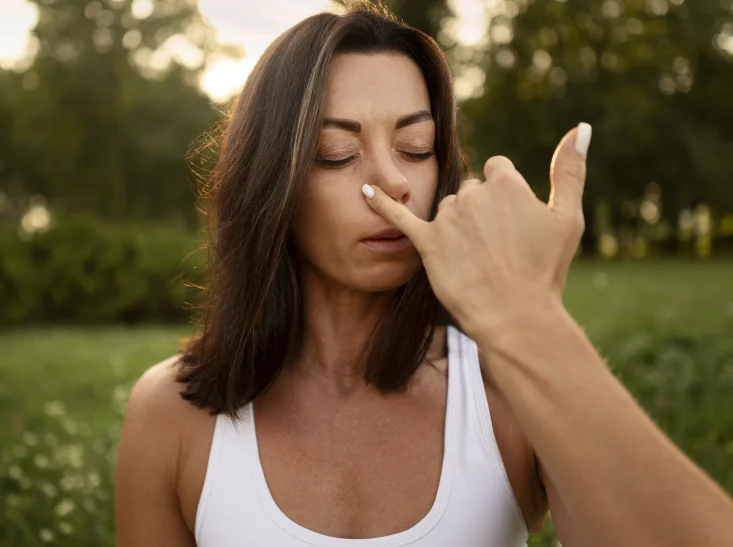
The Impact of Allergies on Rhinoplasty Outcomes
Allergies can be a significant concern for many people preparing for rhinoplasty surgery. Seasonal allergies, dust sensitivity, or chronic sinus issues can all contribute to nasal congestion and inflammation, potentially affecting both the surgery and recovery process. Dr Chris Oosthuizen is a leading rhinoplasty surgeon in Brisbane who prioritises both the form and function of the nose, meaning he takes allergies and nasal health into account when planning and performing rhinoplasty. In this blog, we’ll explore how allergies impact rhinoplasty outcomes and how Dr Oosthuizen expertly manages these challenges for his patients.

The Connection Between Allergies and Nasal Health
Allergies, particularly allergic rhinitis (commonly known as hay fever), cause persistent inflammation in the nasal passages, leading to symptoms such as nasal congestion and sinus pressure. Common allergy triggers include pollen, dust mites, pet dander, and mould. When these allergens enter the nasal passages, they can cause chronic swelling and irritation.
For patients with structural nasal issues—such as a deviated septum or enlarged turbinates—allergies can intensify breathing difficulties. These underlying conditions, combined with chronic nasal inflammation, may make it harder to achieve optimal rhinoplasty results without first addressing allergy management. Properly controlling allergies before and after surgery is important for a smooth recovery and long-term success.
How Allergies Can Affect Rhinoplasty Outcomes
Increased Risk of Infection
Inflamed nasal passages due to allergies can create a habitable environment for infection after surgery. Excess mucus and swelling can trap bacteria, slowing down healing and increasing the risk of post-operative complications.
Prolonged Healing
Patients with uncontrolled allergies may experience prolonged swelling and discomfort during rhinoplasty recovery. Since allergies cause persistent inflammation, they can interfere with the body’s natural healing process, making it take longer for post-operative swelling to subside.
Impact on Breathing
One of the main goals of functional rhinoplasty is to improve nasal airflow. However, if allergies remain unchanged, chronic nasal congestion may persist even after surgery, potentially diminishing the functional benefits of the procedure.
Aesthetic Considerations
Chronic nasal inflammation can affect the final aesthetic outcome of rhinoplasty. Persistent swelling may distort the intended shape of the nose, delaying the final results. Patients who experience frequent allergic flare-ups may see fluctuating nasal swelling, which could impact long-term appearance of their rhinoplasty.
Difficulty in Assessment
During the initial consultation, nasal inflammation caused by allergies may make it difficult to assess the true underlying nasal structure. This can impact the surgical planning process, reinforcing the importance of allergy control before rhinoplasty.
Dr. Oosthuizen’s Approach to Managing Allergies in Rhinoplasty Patients
During the initial consultation, Dr Chris Oosthuizen evaluates the patient’s allergy history, symptoms, and any prior treatments. He encourages patients to discuss any allergy-related concerns, including seasonal triggers, chronic nasal congestion, and any previous sinus infections. This information helps him in crafting a tailored treatment plan that minimises post-operative complications and enhances surgical outcomes.
Pre-Operative Management
efore surgery, Dr Oosthuizen emphasises the importance of controlling allergies to create the best conditions for healing. This may involve allergy testing, adjustments to current medications, or initiating immunotherapy if necessary. Patients may be advised to use antihistamines, nasal corticosteroids, or saline rinses in the weeks leading up to surgery to reduce nasal inflammation and improve recovery potential.
Intra-Operative Considerations
During surgery, Dr Oosthuizen employs techniques that minimise irritation to allergy-sensitive nasal structures. He takes care to preserve and optimise the nasal airway while addressing structural concerns such as a deviated septum or enlarged turbinates. His precision ensures a balance between function and aesthetics while reducing post-operative discomfort for allergy sufferers.
Post-Operative Care
After surgery, effective allergy management is key to a smooth recovery. Dr Oosthuizen provides a tailored post-operative care plan, which may include nasal saline rinses, prescribed medications to control inflammation, and ongoing allergy management strategies. He advises patients on how to avoid common allergens and maintain optimal nasal health to support long-term surgical success.
Long-Term Management and Prevention
Maintaining optimal nasal health after rhinoplasty requires a proactive approach to allergy management. Patients should aim to minimise exposure to common allergens such as pollen, dust mites, pet dander, and mould. Using air purifiers, regularly changing bedding, and keeping living spaces clean can help reduce allergen accumulation. Additionally, continuing prescribed allergy treatments, including antihistamines, nasal sprays, or immunotherapy, can help control symptoms and prevent inflammation that may impact long-term results.
Regular follow-ups with an allergist or primary care physician are essential for ongoing allergy management. These professionals can adjust treatment plans as needed to ensure that nasal health remains stable post-surgery. By keeping allergies under control, patients can preserve the functional and aesthetic benefits of their rhinoplasty and enjoy lasting improvements in both appearance and breathing quality.
Understanding the impact of allergies in rhinoplasty recovery and taking appropriate steps to manage them can help ensure a smoother healing process and better overall outcomes. Dr Chris Oosthuizen’s patient-centred approach ensures allergy sufferers receive the necessary pre-operative and post-operative care to achieve the best possible rhinoplasty results.
If you’re considering rhinoplasty and have concerns about allergies, schedule a consultation with Dr Chris Oosthuizen at Form and Function in Brisbane to discuss your rhinoplasty goal and allergy management strategies.


 (07) 3202 4636
(07) 3202 4636